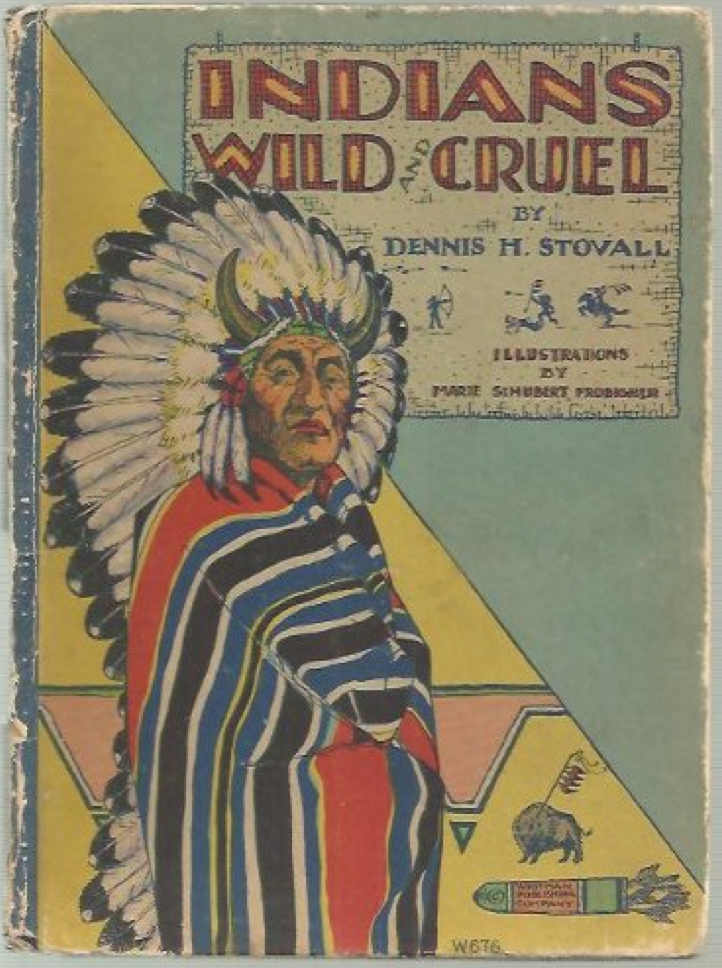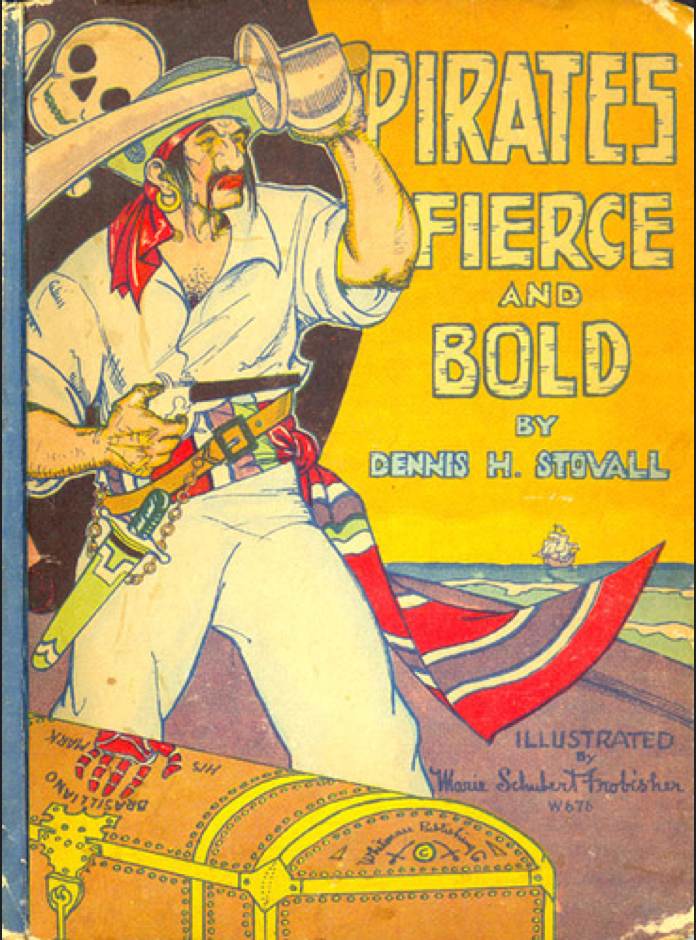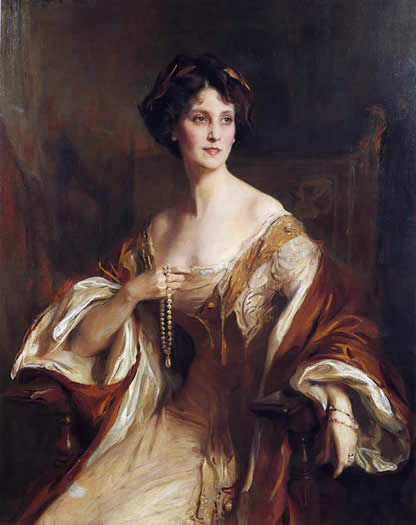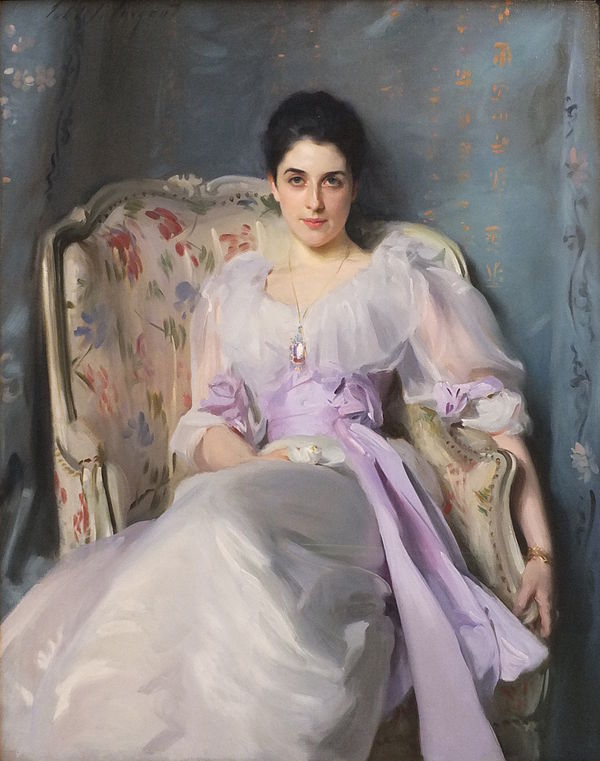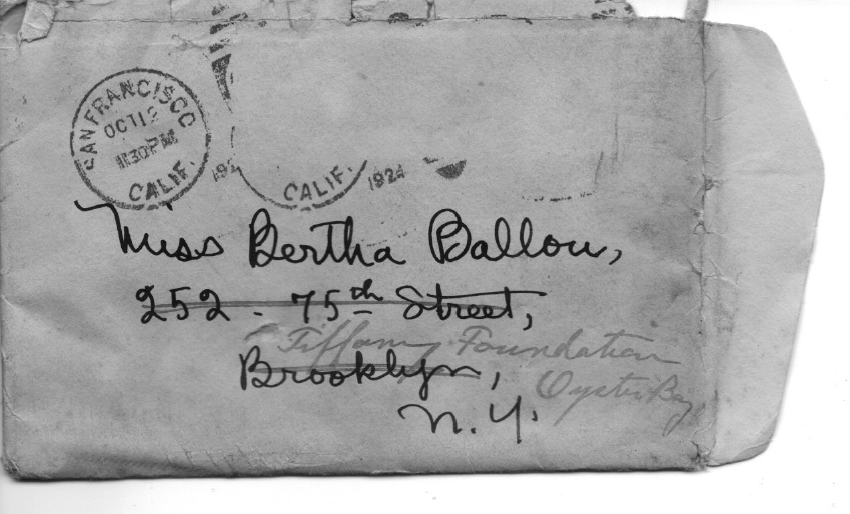To Bertha from Marie Schubert –
Dearest Bertha,
This letter may as well begin with an apology for the envelop for I’m quite convinced before I begin that it will be too fat for anything but a Post Office sort of envelope.
Not that I’ve been having such wild excitement as strikes or presidential candidates but just that I’m feeling somewhat “gabby.”
Our somewhat dwindled away bunch had a couple of perfectly delightful picnics at a camp (on Cedar Island) which Iris Beatly and Louise Herron build. Iris gave us a very hesitating invitation as it is a long, long way from Washington but we (Dorothy, Catherine, and I) promptly fell upon her neck and embraced the opportunity to picnify at her old camp. So the next Sunday we met, laden to the eyebrows with sketching materials, and took the Glen Echo car by storm. After the conductor had been around several times and had relieved us of all our “tokens,” we finally disembarked on a high bluff above the canal. Iris frisked down as gayly and nonchalantly as a mountain goat and from the bottom enjoyed the spectacle of our timorous decent cheering and encouraging us and trying not to burst into indecent hilarity at our sufferings. It was steep as the Flatiron Building. The surface was slimy clay (oozy from the autumn rains) with here and there stones and pebbles which dislodged and skidded under foot. There were also little gullies to catch one high heels.
To make a long story short, we made it somehow uttering little squeaks and feminine noises and bringing with us several ineffective little clumps of grass at which we had wildly clutched. None of us actually sat down and slid though how we escaped doing so is a profound mystery. We all were very much dressed up. I wore a brand-span-new yellow linen suit which cost me a great deal of money and why misfortune spared such a shining victim, I do not understand. However, we reached the bottom damaged only in our nervous systems and found that we must now cross the canal on a bridge consisting of a single teetering plank. There was a handrail on one side but it wasn’t robustly enough attached to afford me any great comfort. I felt that if I leaned upon that weakly rod, I’d plunge into the lock and pull the rod in with me.
Well, we, eventually, all of us, crossed the canal. Then after walking “to the north” miles and miles and miles, we turned toward the river and went puffing and ploughing thru a perfect jungle, across another teetering rickety bridge (with rail on one side only) and once more into the tangled wild wood. Then our troubles were rewarded. We came to the camp under huge wonderful black guarded tree trunks. In front was a wild welter of green and gold sunlit foliage and beyond the shining river, the Virginia shore a fairy-like black-blue vision. It looked as transparent and delicate as tissue paper and oh how deliciously perfumed and cool and fresh the air and a combination of birds, tree fronts, crickets, bumble bees and tickling water to soothe one’s ears.
We all began sketches but one night s well have tried to catch the changes in the hues of a soap bubble. The brilliant flood of gold and green took on a blue shadow then the sky flamed into a marvelous sunset, followed by the tints of the subdued fire one sees in the plumage of gray pigeons.
Meanwhile, Iris had been very busy making magic over a campfire which began to be very picturesque in the gathering purple gloom and presently on a table build under the trees we were served with a Spanish affair constructed as follows. In a deep fry pan were laid numerous strips of bacon. When they were crisp and brown, an egg omelet was fried in the bacon grease. This was served to us with a sauce poured over made of minced peppers and onion stewed in fresh ripe tomatoes. Hot red beans, olives, sandwiches, fruit, cheese and little cakes completed the menu. You cannot imagine how delicious it tasted with the faint smoky tang. It was just perfectly yum-yummy. When it was pitch black dark, we formed a line and stumbled back thru the jungle headed by Iris carrying a small smoky lantern. There were also little yellow glow worms but they didn’t help much. Later, walking back by the canal, a ragged yellow piece of a moon straggled in and out of the dense clouds overhead but it really didn’t help much, either. However, there were enough of us to be heard clear to Washington if anything had startled us shrieking. So, we weren’t nervous at all.
We had all had such a really delightful time that it was decided to do it again. The second picnic was very like the first but the menu was quite different. We built a huge fire and having made a big bed of coals, we roasted sweet potatoes and roasting ears of corns in it and, over it, toasted weenies which were put between thin slices of white bread and butter. You can’t imagine how different and toothsome it all was. We also had rye bread and Swiss cheese sandwiches, potato chips, peaches and cakes and this time we had a real moon bobbing in the canal among a million stars as we came home. I just loved every minute of it.
Later –
This is a continued in our next affair and second section begins at this point. Let me see… I haven’t told you about the matinee. I’ve seen several lately all quite singularly gloomsome. “Martinique” the story of a very charming girl who discovers that she is a half breed. Very dramatic and exceedingly picturesque settings and costumes. “Beyond the Horizon” a story of a little country girl who marries the wrong brother. However, as usual, he is conveniently removed by pleurisy (or something hollow and heartrending in his chest) and the right brother comes back, and, at the benevolent request of the dying wrong one promises to marry the widow as soon as she becomes one. But when I said the matinee, I meant a really wonderful play adapted from the Spanish by Mary Roberts Rinehart and Avery Hopwood. It was a truly great play. A melodrama. I suppose but what one might call a classic melodrama. The costumes were by somebody in Seville and authentic. The cast was mostly the original cast imported from Spain. It was quite distinctively foreign in ideals, situations scenery and personnel. As Dorothy said even their feet were foreign queer narrow long squared toed delicate-leather boots. Maria del Carmen the heroine impressed herself forever upon my memory by kneeling in the shadowed foreground at a candle lighted shrine. She wore a marvelous fuchsia red satin, a white blouse and white satin slippers with red heels. She had blue black glittering hair. The background was formed by a brilliant yellow-green sunlight, showered countryside with shimmering sapphire sky and big soft white cloud masses seen thru an arch in the neutral colored shadow wall. Oh if I were Ignacio Zuloaga… There were pictures like that all through the play. One’s first glimpse of Peucho (the hero) is when he suddenly stands a figure of tragedy, dusty and travel worn and hunted and betrayed in the midst of the dancers (who are whirling about like brilliant flowers in their fall skirts) celebrating the betrothal of his sweetheart to his rival. The scene is a wild riot of shifting swaying dazzlingly rich variety of color arrested by this somber figure. I loved it, I just loved it. Peucho has stabbed Xavier in a fair fight, Maria del Carmen to save Peucho nurses Xavier, who falls madly in love with her, Peucho hearing that Maria del Carmen is to marry Xavier risks arrest and returns from exile. By his mother, he places his life in jeopardy and she promises Xavier’s father to marry Xavier if they will not produce Peucho’s dagger (which is in their possession) at the trail. There was a wonderful night scene where Xavier standing in the purple gloom overhears the noted surgeon tell his father that he cannot live. The father and the surgeon look so warm and alive in the flow of orange light from a queer old lamp and poor Xavier looks so gray and cold and ghastly and ghost-like in the dim cold shadow. The father is in a passionate emotional protest by Xavier stands quiet overwhelmed and hopeless. You feel almost as if he were already dead. I can’t convey in the mere words how perfect the artistry was but every character was satisfying and convincing and color and psychology were made to harmonize throughout. Added to this, the plot was unusual. The costumes were real. The orchestra was mercifully concealed somewhere and while at crucial moments one was aware of barbaric brilliant strains of plaintive weird melodies one didn’t see an orchestra leader doing acrobatics or a prosaic Yankee rattling castanets with one eye upon a sheet of music under a green shaded electric light. I was so thrilled all the way there. I wept for poor dying Xavier. I wept with his desolate father. I wept for that splendid hunted deserted Peucho and oh I wept woops over that adorable abused tenderhearted ill-fated Maria del Carmen. I do declare there were times when it seemed as if I just couldn’t stand it to see that sweet child so put upon by fate. I felt that I must go right to her and join in the affair and do something about it. Poor Dorothy eventually became almost as concerned over me as she was over the heroine. She said, “It isn’t good for you to get so worked up and excited, Marie. I’m sure it isn’t good for you!” Afterward, she took me out and bleary eyed and pale and exalted (it was one of these blistering hot days) and bought me a sundae to cool me down a little. I was just having a lovely time though and the play will be a perfect storehouse of charming memories in my mind for years to come. Dorothy and I enthusiastically agreed that it was a really great play.
My thoughts are beginning to wander a trifle. You see the kittens have suddenly decided to climb my-er-stockings and I feel as if I were being attacked by a flock of frolicsome sandspurs. Excuse me a moment while I remove the little pests.
Iris is soon to be in New York. Dorothy and Catherine still plugging away at the navy department. They plan to enter (night class) the Corcoran again as soon as it opens. Dorothy said she intended writing you all about that when they got started and hear the gossip and get the sniffle of turpentine once more in their nostrils (words to that effect) n’everything. As for me, I am counting the weeks now, just seven more, and trying to realize that this wonderful thing is really going to happen. One doesn’t realize the miracle of it until it becomes part of one’s personal experience then it ceases to be a commonplace fact and everyday occurrence and becomes suddenly beautiful and almost unbelievable like a fairy tale magic.
Do write again soon. I loved your letter and I miss you so much.
As ever,
Marie
